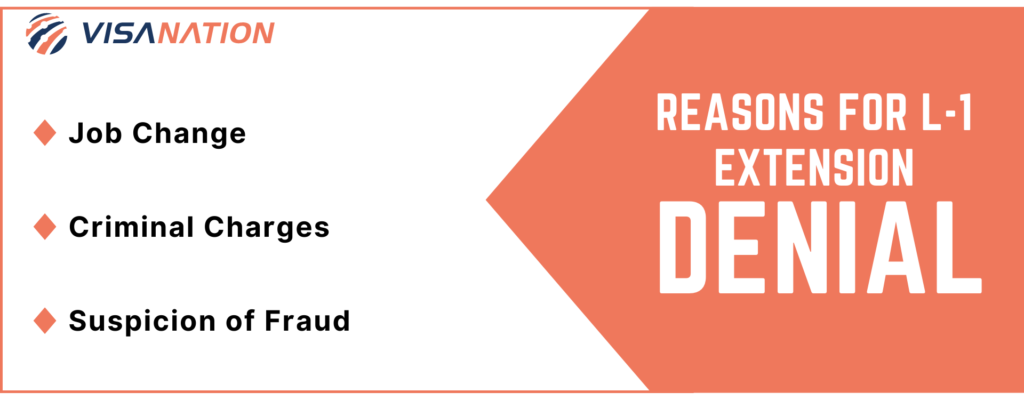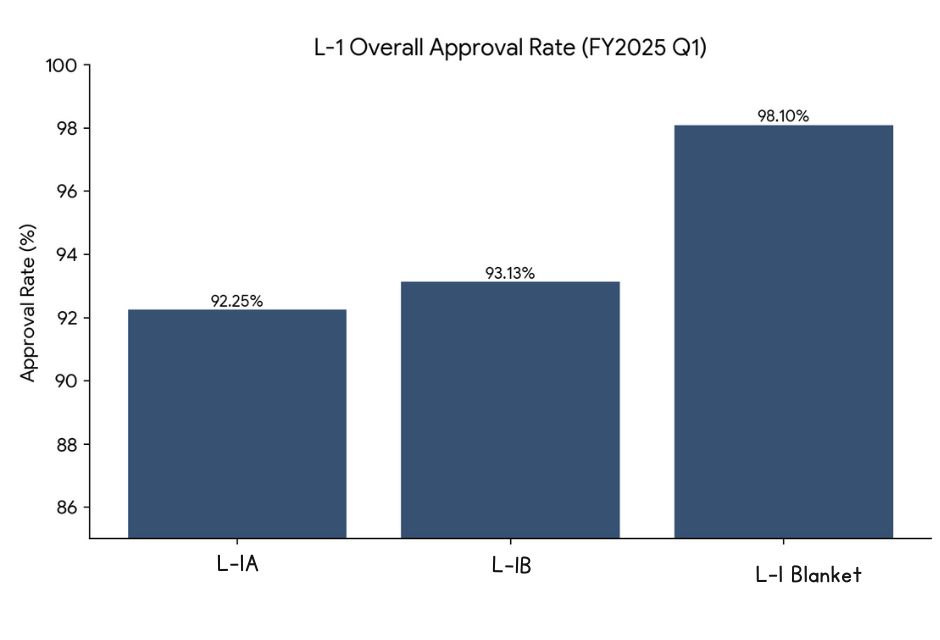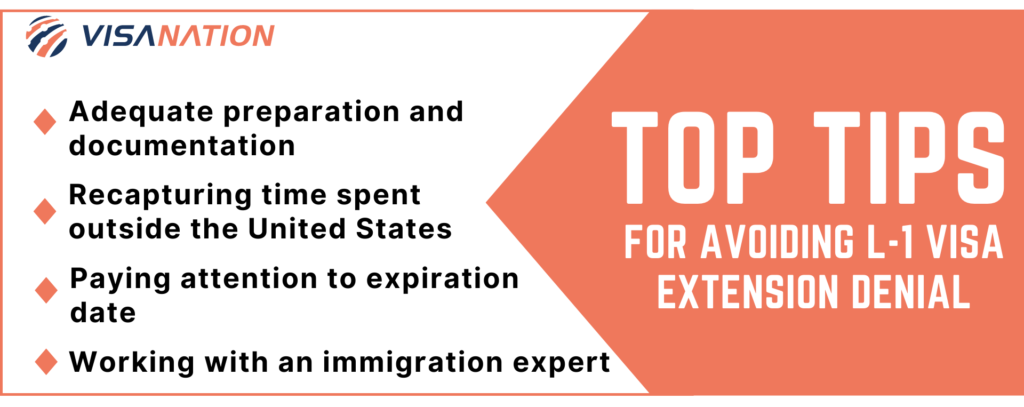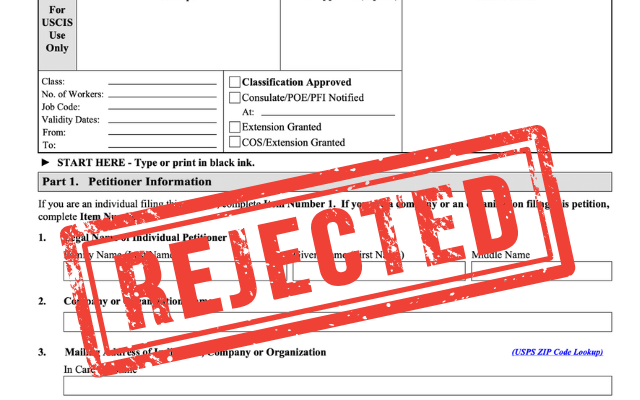When it comes to your immigration status, having a visa extension denied can be an extremely distressing situation. Fortunately, with the guidance of an experienced immigration attorney, there are some options available to you if you ever find yourself in this predicament. Whether you’re facing an L-1 extension denial or seeking to avoid one altogether, we’ve outlined some action steps to set you up for success.
L-1 Overview
The L-1 visa is a valuable work visa that allows multinational companies (have branches, offices, or affiliates in the U.S.) to transfer key employees to that branch. To qualify, the beneficiary (you) must be an:
- Executive: Able to make far-reaching decisions within the company without oversight. Note that the title “account executive” typically doesn’t qualify.
- Manager: Responsible for day-to-day operations and managing employees.
- Specialized Knowledge Employee: Possesses unique knowledge critical to the functioning of the U.S. branch or office.
L-1 Visa Classifications:
- L-1A for managers and executives
- L-1B for specialized knowledge employees
An L-1 visa also allows you to establish a new U.S. branch or office if one does not already exist.
How Long Is The L-1 Period of Stay
- L-1A: Initially, your L-1 visa will be granted with an initial stay of 3 years, extendable up to 7 years.
- L-1B: Up to 3 years (or 1 year for a new office scenario), with a 2-year extension for a total of up to 5 years.
However, petitioning for an extension is not a simple task and essentially requires that you re-petition for your L-1 visa. You will need to prove to the USCIS that you are still qualified for this visa class.
L-1 Approval Rates
In past years, L-1 visa applicants experienced high rejection rates among USCIS applications; however, approvals have been trending more positively.

- Approval rate: 92.25% (5,155 approvals out of 5,588 completed cases); Denial rate of 7.75% based on Q1 FY 2025 data.
- RFE Rate: 24.48% (1,368 RFEs issued), of which 72.2% were eventually approved
What contributes to these denial rates?
- Scrutiny of “specialized knowledge”
- Inadequate response to USCIS Requests for Evidence (RFE)
- Insufficient evidence of a qualifying relationship
- USICS scrutiny tends to be highest for new office petitions, beneficiaries with general roles, small businesses/startups

For the majority of extension applications, you must submit a brand-new L-1 immigration application.
How to File for an L-1 Visa Extension
To request an L-1 visa extension, your U.S. employer will need to file the I-129 Petition for a Nonimmigrant Worker with the USCIS.
The form must be submitted with all the necessary supporting documents. Failure to file your petition properly may lead to delay or denial.
What Are L-1 Extension Denial Reasons?
Here are some of the more common reasons that the USCIS gives for issuing an L-1 extension denial:
Job Change
Job changes are a common reason for L-1 extension denials. It’s very common for job positions roles to change over time even if the position title remains the same. With that said, if the new role does not meet the USCIS criteria for executive, managerial or specialized knowledge, you may face a denial.
As stated earlier, when you petition for an L-1 extension, you are essentially re-petitioning for a new L-1 visa.
Example:
Hubert entered the U.S. with L-1 status as a web developer for an online marketing company. Later, his company eliminated his department and reassigned him to an on-call general support role. Since this new position doesn’t qualify as specialized knowledge, Hubert’s extension was denied.
Criminal Charges
Being convicted of a crime in the U.S. is a common reason for L-1 extension denial. This also goes for almost any immigration status.
Even if you only served a sentence of a few months for a misdemeanor, it could still have a serious impact on your ability to extend your visa. There is also an aspect of immigration law called the Petty Offense Exception. This does not excuse your crime nor expunge your offense, but it does give the immigration officer discretion to approve or deny your L-1 visa extension.
However, this is rare and should not be relied upon. In any case, you must report any arrests on your petition and answer truthfully if asked. Not doing so could result in serious consequences.
Regardless, if you have been convicted of a crime in the U.S., talk to your immigration attorney before petitioning to see if your offense will result in having your L-1 extension denied.
Suspicion of Fraud
USCIS is constantly monitoring for fraud. Inconsistencies in your applications can trigger red flag so to avoid this:
- Be sure all details are consistent with prior filings
- Work with a qualifeid immigration attorney to avoid triggering an RFE

Will the USCIS Always Issue an RFE?
Not necessarily. There are times when the USCIS sees a discrepancy in your information or finds that your evidence is lacking, warranting a Request for Evidence to be sent.
However, this will not necessarily always be the case. There is always the chance that you may have your L-1 extension denied without an RFE. If you receive an RFE respond promptly with the assistance of your attorney.
How to Avoid an L-1 Visa Extension Denial
Here are some ways to minimize your risk of denial:
Proper Documentation: You will need to take the time to have all the required documents in order. This may include:
- Proof of employment for the period you have been in the United States
- A letter from your foreign qualifying employer detailing your job responsibilities, employment dates, and wages for the duration of your employment
- A letter of support from the U.S. petitioner explaining your work schedule, responsibilities, salary, and other related terms and conditions for your L-1 employment
Recapturing Time Spent Outside the United States: If you have spent a significant amount of time outside the United States during your L-1 visa validity period, you may want to recapture it by submitting the necessary documents during your application for extension. The recaptured time will earn you some more time to stay in the U.S.
To do this, you will need to submit details of your travel itinerary indicating the number of days spent abroad. Proof of your physical presence overseas will also be required. This may include plane tickets, boarding passes, passport stamps, and other related records.
Paying Attention to Expiration Date: Don’t let your status expire before applying for an extension. You should also ensure that your passport will remain valid throughout the duration of the processing of your L-1 visa extension.
Working with an Immigration Expert: Filing an application for an L-1 visa extension can be complex, given the long list of documents and the processes involved. However, you can relieve yourself of the stress and improve your chances of getting approval by engaging the service of an experienced L-1 visa immigration attorney. Your lawyer will help you prepare the documents and file the application form according to USCIS standards. This will also reduce the chances of receiving a request for additional evidence (RFE) which can cause delays.
What Are My Options After L-1 Extension Denial?
If your I-94 departure date has not yet expired, then you still have time to make a decision concerning your case. No matter what, start with finding a qualified immigration lawyer to advise you every step of the way. This way you can avoid the common pitfalls people tend to make when they are panicked about having to leave the U.S.
Here are some of the next steps that might be available to you:
Transfer Your Status
If you qualify for another nonimmigrant visa or even a green card, then you may want to consider transferring your status from L-1 to a different status. However, this will require you to fulfill the qualifications for the new status as well.
For example, if you wanted to change your status to H1B status, you would need to have at least a bachelor’s degree and a specialty position in your company that is relevant to your education.
If you are interested in immigrating to the U.S. permanently, then L-1 status allows it through a condition called “dual intent”. Depending on your qualifications, you may be eligible for one of the employment-based green cards like the EB-2 or the EB-3.
L-1 Grace Period
There are many questions surrounding whether or not a grace period comes into effect after you receive an L-1 extension denial. The answer, unfortunately, is no. There is no official grace period that proceeds a denial.
However, this does not necessarily mean that you will be deported or considered “out of status” if you do not leave right on your I-94 departure date. The immigration officer reviewing your case may choose to be lenient especially if your reasoning is sound.
With that being said, you should always contact your immigration attorney before making any decisions like this one. If the officer considers you “out of status”, then you may risk being temporarily barred from re-entering the U.S. depending on how long you overstayed your departure date.
Outside of transferring your status, you may be able to appeal your case or file a Motion to Reopen or Reconsider. However, this is a very complex and involved process that should be discussed at length with your immigration attorney.
When to File L-1 Visa Extension
The L-1 visa is issued with an initial stay of one year for employees entering the U.S. to establish a new office and an initial stay of three years for all other employees. Therefore, depending on your own initial period of stay, you can apply for an extension any time up to six months before the expiration of your current visa.
What is important is to not allow the visa to expire before applying for an extension. As long as your application reaches the USCIS before the expiration date of your current visa, you should not need to leave the U.S. while waiting for approval. However, we recommend that you submit your application for extension at least 45 days prior to the expiration date.
L-1 Visa Extension Processing Time
The L-1 visa extension processing time is 3.7 months according to USCIS data. Processing times depend on the workload at the USCIS service center in charge of your case.
Can I Use Premium Processing for My L-1 Visa Extension?
You may be able to use premium processing to expedite your L-1 visa extension application. Instead of waiting for several weeks to receive a decision on your I-129 form, with premium processing, the USCIS will adjudicate the application within 15 business days. To use the premium processing service, you will need to pay an additional $2,805.
Bear in mind, however, that this service will only help you shorten the overall processing time of the I-129. It doesn’t guarantee that your L-1 visa extension will be approved. In the event that USCIS is unable to process your case within 15 business days, they will refund your premium processing fee.
L-1 Visa Extension: Regular vs Blanket
An employer may file a single L-1 visa for an individual employee or file a blanket for multiple employees simultaneously. In the same vein, an L-1 visa extension can be either for a regular or blanket application. It is worth noting, however, that not all employers qualify for an L-1 blanket petition.
An employer may qualify for a blanket petition if they have a minimum of 1,000 employees and have obtained L-1 visas for a minimum of 10 foreign employees. In addition to that, the organization must have at least $25 million in combined revenue.
If your original L-1 visa was approved through the regular process, you will likely process your visa extension through the same route – a single extension application for an individual employee.
If you received your original L-1 visa through a blanket petition, your employer can choose the same blanket route to file extensions for multiple employees at the same time. You must pay attention to the specific details of the category you are applying for and prepare your documentation accordingly.
Can Relatives on an L-2 Visa Extend Their Stay?
Your spouse and children on an L-2 visa can also extend their visas. However, while you (the primary beneficiary) will need the I-129 form for an extension, your relatives will need to submit the I-539 form. They must also do so before their current L-2 visa expires—ideally, at least 45 days before the expiration date.
How VisaNation Law Group Immigration Attorneys Can Help
Immigration law is both stringent and constantly fluctuating. You must keep up with it in order to be sure that you are making the right decisions.
VisaNation Law Group lawyers have extensive experience helping people through the toughest situations regarding work visas. They’ll make sure that you are making the best decisions for your case if you have received an L-1 extension denial. To get in touch with one of the attorneys, don’t hesitate to schedule a consultation for your L-1 case today.

